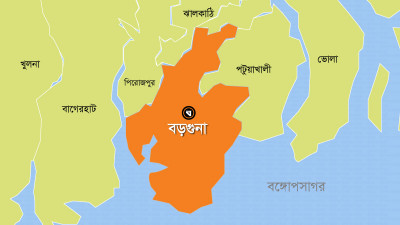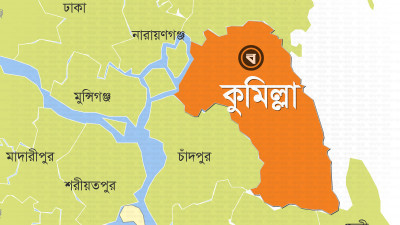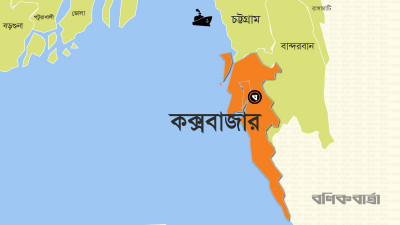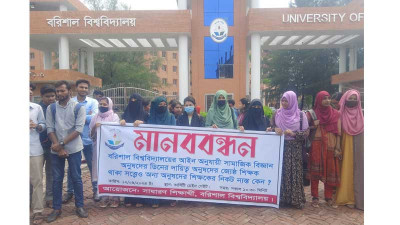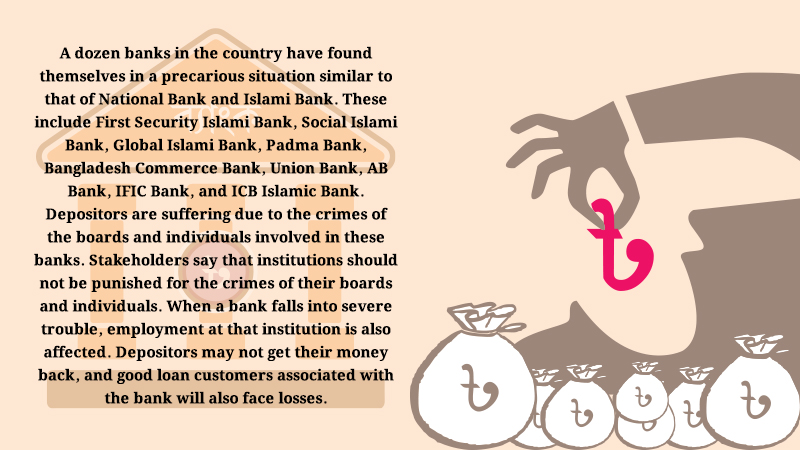 Photo: Bonik Barta
Photo: Bonik Barta Under the patronage of regulatory bodies in the
banking and financial sector, National Bank Limited has suffered significant
damage over the past decade due to irregularities and corruption. The
leadership was provided by the bank's late chairman, Zainul Haque Sikder, and
the board led by his children. Senior officials, including the bank's Managing
Director, played a role as accomplices. At least BDT 300 billion was siphoned
off from the bank under the guise of loans. Although a central bank-appointed
observer was present on the bank's board during this time and all decisions of
the board had the central bank's approval, no efforts were made to address or curb
the irregularities and corruption.
In February 2021, Zainul Haque Sikder, who was the
chairman of National Bank at the time, died from COVID-19. Following his death,
the Bangladesh Bank (BB) took initiatives to address the irregularities at the
bank. Successive sanctions were imposed on the bank, and loan distribution
activities were halted. This adversely affected the bank’s good customers. Due
to financial difficulties, many customers were unable to open letters of credit
(LCs) through the bank. The first-generation private bank is now struggling to
repay depositors' funds.
Since 2016, over a period of seven years, one of the
banks suffering from irregularities and losses is Islami Bank Bangladesh PLC.
At least BDT 800 billion in loans were siphoned off from the country's largest
private bank, both officially and unofficially. The leadership in this case was
provided by the bank's board, which is controlled by the S Alam Group. Senior
officials from the Bangladesh Bank and Islami Bank also played a role as
accomplices.
After the fall of Sheikh Hasina's government, the
central bank took initiatives to address irregularities at Islami Bank. Various
restrictions were imposed on withdrawing deposit funds and distributing loans
from the bank. As a result, both the bank's depositors and its good loan
customers have suffered. The largest private bank in the country is also unable
to provide funds as needed from its ATM booths. Furthermore, hundreds of checks
deposited in various banks are not being cashed.
At least a dozen banks in the country have found
themselves in a precarious situation similar to that of National Bank and
Islami Bank. These include First Security Islami Bank, Social Islami Bank,
Global Islami Bank, Padma Bank, Bangladesh Commerce Bank, Union Bank, AB Bank,
IFIC Bank, and ICB Islamic Bank. Depositors are suffering due to the crimes of
the boards and individuals involved in these banks. Additionally, customer
businesses of these banks are also facing severe difficulties.
Stakeholders say that institutions should not be
punished for the crimes of their boards and individuals. When a bank falls into
severe trouble, employment at that institution is also affected. Depositors may
not get their money back, and good loan customers associated with the bank will
also face losses. This will have a negative impact on the economy. Measures
need to be taken against those involved in the irregularities and corruption at
the bank. It is essential to ensure that depositors and institutions are not
harmed.
When asked about this, former Finance Secretary and
Comptroller and Auditor General (CAG) Mohammad Muslim Chowdhury told Bonik
Barta, "There is a relationship between institutions, employment, and the
economy. While taking punitive actions against wrongdoers, it is important to
ensure that the institution and employment are not harmed. Depositors are
unable to withdraw money from the bank as needed, which acts as a form of
punishment for them. Many financial institutions have locked up depositors'
funds. We need to ensure that such situations do not occur in banks as
well."
With the assistance of central bank officials, the
controversial Prashant Kumar Halder, more commonly known in the financial
sector as PK Halder, single-handedly took control of four financial
institutions (NBFI) a decade ago. He embezzled nearly BDT 40 billion from four
companies: Peoples Leasing, International Leasing, Bangladesh Industrial
Finance Company Limited (BIFC), and FAS Finance.
The institutions affected by PK Halder’s corruption
are unable to return depositors' funds. For several years, depositors have been
going door to door in hopes of getting their money back. They have also
organized human chains, rallies, and meetings to reclaim their savings.
However, there has been no visible initiative to return the depositors' money.
The institutions are now being managed by boards formed by the court and the
Bangladesh Securities and Exchange Commission (BSEC). Meanwhile, PK Halder is
currently detained in an Indian jail.
In addition to these, at least a dozen more
financial institutions in the country are unable to return depositors' funds.
These institutions have fallen into severe trouble due to a large portion of
distributed loans becoming defaulted. Many of these institutions have laid off
employees. The weakening of these financial institutions is also casting doubt
on the operations of well-performing institutions.
On condition of anonymity, the chief executive of a
second-generation private bank in the country told Bonik Barta, "At one
time, with the central bank's assistance, the country's banking and financial
sector fall victim to widespread irregularities and corruption. Many high-level
officials of the central bank also benefited from the embezzled funds. Some
banks were kept afloat through various unethical advantages. If all these
benefits are suddenly withdrawn, the banks will not be able to survive. Around
2016, the entire banking sector was shaken due to one such bank, Padma Bank. If
five to seven banks fail to repay their debts simultaneously now, the situation
could spiral out of control. This could lead not only to uncertainty in the
banking sector but potentially threaten the entire economy."
On Tuesday (August 20), the central bank dissolved
the board of National Bank due to its failure to protect deposits. A new board
has been appointed for the bank. Additionally, an announcement was made on
Wednesday (August 22) regarding the dissolution of the board of Islami Bank. In
this context, Governor Dr. Ahsan H Mansur told reporters, "The S Alam
Group has siphoned off a large amount of money from Islami Bank under various
names. No director from the group will be allowed on the bank’s board until
this money is recovered. The shares of Islami Bank held by the S Alam Group
will be under government control and cannot be traded. The group can return to
ownership if they repay the loan amounts taken from the bank. For now,
independent directors will be appointed to the bank, which will play a role in
its restructuring."
Earlier on Tuesday, business leaders visited the
central bank to meet with the new Governor, Dr. Ahsan H Mansur. After the
meeting with the business leaders, the Governor told reporters, "A bank
cannot continue if depositors lose confidence in its management. It is not always
right to try to rescue such banks. The management of the bank itself is
responsible for this situation; they have brought the bank to this condition on
their own. The central bank will not provide any new assistance to them. Those
who are guilty will be held accountable. However, no institution will be
targeted."
When asked about the overall situation, Dr
Salehuddin Ahmed, the Economic and Commercial Advisor to the interim government,
told Bonik Barta, "I have instructed the central bank to ensure that no
bank's checks are rejected. Last week, it was possible to withdraw BDT 2 lakh in
cash from the bank. This week, the withdrawal limit has been increased to BDT 3
lakh. I hope the situation will gradually return to normal. The central bank
has taken steps to restructure the boards of weak banks. This initiative will
ensure that no institution is harmed."

